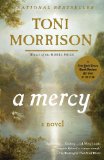Summary | Excerpt | Reading Guide | Reviews | Beyond the Book | Read-Alikes | Genres & Themes | Author Bio

Critics' Opinion:
Readers' Opinion:
First Published:
Nov 2008, 176 pages
Paperback:
Aug 2009, 224 pages
 Book Reviewed by:
Book Reviewed by:
Amy Reading
Buy This Book
This article relates to A Mercy
Toni Morrison locates her novel at a moment of transition in American
history, the moment when, to use the historian Ira Berlin's terms, a society
with slaves became a slaveholding society. British colonialists had owned
African slaves ever since the founding of Jamestown, but in the beginning of the
seventeenth century, slavery was just one form of labor among many and
slave-owners were few.
No laws yet existed to govern this relationship, and African slavery was not yet
a legally defined identity. In the mid-Atlantic region, black slaves were
treated similarly to white servants and the two groups forged solidarities
across racial lines. Neither group was treated well, but slavery was not yet
legally protected as a special category of human exploitation in which masters
trumped even courts in determining their slaves' lives. Slaves, like servants
and indeed like the owners who labored next to them in their tobacco fields,
could expect Sundays, half of Saturdays, and holidays off. Slaves could forego
their right to food and shelter from their owners in exchange for time and land
to farm for themselves, leading to a small slave economy in the Chesapeake
region. Some blacks even earned enough to purchase their freedom. A small but
significant number of free blacks lived in the Chesapeake during the
mid-seventeenth century, demonstrating to all the permeability of the boundary
between slavery and freedom.
As the century wore on, that boundary began to harden. In the 1660s, when the
Chesapeake region began growing tobacco for trade across the Atlantic, chattel
bondage was legalized and made hereditary. In the 1670s, the slave-owning
planter class seized control of the economy and designed it for maximum, brutal
efficiency, leading to a society in which the master-slave relationship was
paramount. They stepped up their importation of African slaves into the region
and slaves almost entirely replaced indentured white servants. Chesapeake
legislators cracked down on the slave economy by making it unlawful to trade
with a slave, though many ignored the stricture. The routes to manumission were
narrowed. In 1691, the Virginia legislature banned marriage between whites and
blacks. Slaves' right to travel was drastically curtailed. And on the
plantations, masters ruled with unfettered power, unchecked by sheriffs or
judges.
As Berlin writes in Many Thousands Gone (the book from which the above
facts were taken), "Knowing that a person was a slave does not tell everything
about him or her. Put another way, slaveholders severely circumscribed the lives
of enslaved people, but they never fully defined them. Slaves were neither
extensions of their owners' will nor products of the market's demand. The
slaves' history—like all human history—was made not only by what was done to them but also by what they did for themselves." And that's where novelists take over from historians.
Filed under Society and Politics
![]() This "beyond the book article" relates to A Mercy. It originally ran in January 2009 and has been updated for the
August 2009 paperback edition.
Go to magazine.
This "beyond the book article" relates to A Mercy. It originally ran in January 2009 and has been updated for the
August 2009 paperback edition.
Go to magazine.





The Flower Sisters
by Michelle Collins Anderson
From the new Fannie Flagg of the Ozarks, a richly-woven story of family, forgiveness, and reinvention.

The House on Biscayne Bay
by Chanel Cleeton
As death stalks a gothic mansion in Miami, the lives of two women intertwine as the past and present collide.

The Funeral Cryer by Wenyan Lu
Debut novelist Wenyan Lu brings us this witty yet profound story about one woman's midlife reawakening in contemporary rural China.
Your guide toexceptional books
BookBrowse seeks out and recommends the best in contemporary fiction and nonfiction—books that not only engage and entertain but also deepen our understanding of ourselves and the world around us.